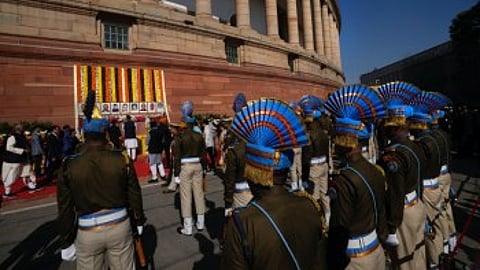

The ongoing skirmishes between Indian and Pakistan, pregnant with the possibility of turning into a full-scale war, mark a paradigm shift in India’s posture in dealing with the terror menace and a difficult neighbour.
On the night of May 6-7, the Indian Army launched a bold military operation deep inside Pakistan, annihilating nine terrorist bases. Among the 100 or so slain were multiple jihadists, including 10 relatives of Jaish-e-Mohammed chief Masood Azhar. Contrast it with the reticent India of 2008, when it remained largely mute after Pakistani terrorists killed 166 innocents in the 26/11 Mumbai attacks.
The retribution by India, albeit anticipated, was unprecedented in its sheer scale, precision, detailed planning and meticulous execution. This path-breaking initiative was a healthy departure from the past, when any foreign-sponsored terror act usually evoked only ‘strong protests’ or ’kadi ninda’ (strong condemnation).
Meanwhile, the terrorists happily retreated to their state-maintained safe havens in Pakistan, busying themselves with their next target and preparing for a new strike. The vicious cycle continued unabated.
The grim tally of jihadist attacks—including the ones on the Indian parliament (2001), Akshardham temple (2002), Mumbai (2006, 2008, 2011), Delhi (2005, 2008), Jaipur (2008), Ahmedabad (2008), Pune (2010), Varanasi (2010), Hyderabad (2013), and Bodh Gaya (2013)—testifies to this strategic inertia. Around 500 innocent lives were lost in these terrorist attacks. If one were to include other acts of terrorism alongside those in Jammu & Kashmir, the death toll would be significantly higher.
That inertia, however, is now a thing of the past. In the last 11 years, barring historically volatile Jammu & Kashmir and some Maoist-infested districts, the rest of India has hardly experienced any significant terror attacks. This relative peace can be attributed to the changed paradigm that the current Indian leadership is pursuing in dealing with terror and those sustaining it, within and outside the country.
In response to earlier terror attacks—Uri in 2016 and Pulwama in 2019—India carried out surprise surgical strikes without prior warning. India was more open about its intent this time; The prime minister was publicly unequivocal about his resolve to punish the guilty. Operation Sindoor, a result of immaculate planning, was the outcome.
In this civilisational conflict, India now walks the path with countries like the US and Israel, which have a history of hounding and punishing their enemies, irrespective of the cost involved and whichever corner of the world they are holed up in. Few, including Pakistan, could have imagined such a decisive response from India.
The ambivalent Indian attitude towards its civilisational challenges, seen prior to 2014, isn’t a recent phenomenon. It has its origins in its naive philanthropy. Steeped in a pluralistic ethos, India failed to comprehend the viciousness of creeds and ideologies that brook no dissent, terming all differing perceptions as blasphemy, usually punishable with death.
In this spirit, Mahatma Gandhi supported the foreign and religious Khilafat movement (1919-1924). However, this gesture was reciprocated with violence: the Moplah massacres (1921), several communal riots, and the brutal Direct Action Day in Calcutta (1946).
Instead of confronting this divisive mindset head-on, even after independence, India didn’t learn the necessary strategic lessons. When Pakistan attacked Kashmir shortly after independence, India’s leadership committed a historic blunder by halting advancing Indian troops when the Pakistani army was losing and retreating fast.
In 1960, India signed the Indus Waters Treaty with Pakistan, conceding water rights and paying what amounts to `700 crore in today’s terms in 10 instalments—yet another costly blunder. Pakistan answered by launching another war in 1965. Indian forces marched to Lahore, but again returned the conquered territory at Tashkent. In 1971, India took 93,000 Pakistani soldiers prisoners during the Bangladesh liberation war, and released them unconditionally. Pakistan returned the favour by trying to capture Siachen in 1984.
In February 1999, India extended a hand of friendship, and within months, Pakistan did Kargil. Although India successfully evicted the intruders, it refrained from punishing Pakistan further.
The nadir came in 2008 when, despite irrefutable evidence of Pakistani involvement in the 26/11 attacks, the UPA government gave Pakistan a free pass. A section of the ruling dispensation sought to blame the RSS-BJP, concocting the false narrative of ‘Hindu terror’—even though terrorists like Ajmal Kasab, David Headley and Tahawwur Rana had been captured alive.
This pattern of obfuscation and denial extended beyond 26/11 to the 1993 Mumbai serial blasts, the 1998 Coimbatore bombing, and the 2013 Gandhi Maidan attacks in Patna. In most instances, inconvenient truths were suppressed, and the terrorists and their sponsors were mostly allowed to go unpunished.
It’s changing now. Pakistan, however, fails to comprehend the resolve of this new India. Since 2014, India has undergone a profound strategic transformation and is now committed to waging an unrelenting war against terrorism. Pakistan has two choices: either to radically reform its ideology or engage in a decisive confrontation with India. No prizes for guessing the outcome of such a war.
(Views are personal)
Balbir Punj
Former Chairman,
Indian Institute of Mass Communication